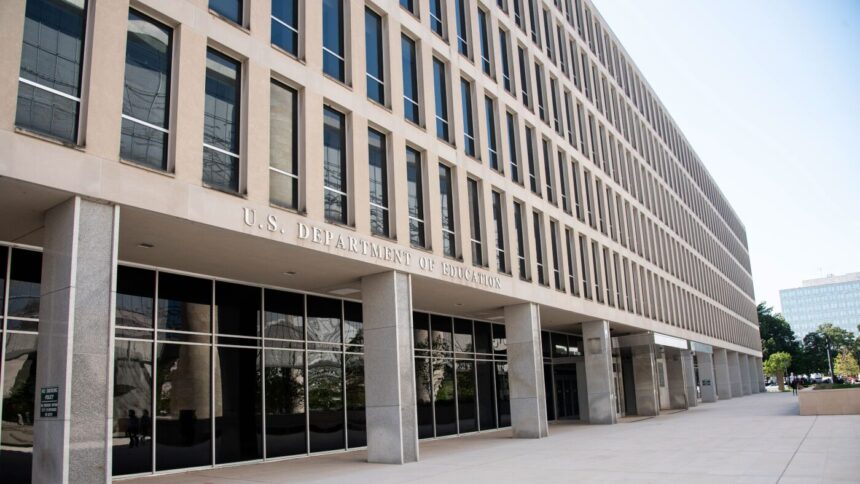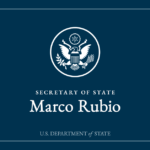
President Donald Trump has mentioned repeatedly that he’ll attempt to shut the U.S. Division of Schooling, seen right here in Washington, D.C.
Robert Knopes/Schooling Occasions through Getty Photos
cover caption
toggle caption
Robert Knopes/Schooling Occasions through Getty Photos
The Trump administration is exploring dramatic cuts to applications and workers on the U.S. Division of Schooling, together with government motion shuttering division applications that aren’t protected by legislation and calling on Congress to shut the division solely.
The manager motion may come as early as this week, in line with a number of authorities sources who weren’t cleared to debate the administration’s plans publicly.
The White Home didn’t reply to a request for remark.

Information of the Trump administration’s plans was first reported by The Wall Avenue Journal.
This potential government motion comes after the Trump administration, in current days, positioned dozens of Schooling Division workers on paid administrative depart with little rationalization, saying solely that the strikes had been the results of President Trump’s government motion focusing on federal range applications.
Taken collectively, the information has unsettled division workers and is certain to come back up within the Senate affirmation listening to for Trump’s nominee to be schooling secretary, Linda McMahon. That listening to has not but been scheduled.
The division, with roughly 4,400 workers and an annual finances of $79 billion, has broad duty over three main areas: managing roughly $1.6 trillion in federal pupil mortgage debt, overseeing implementation and enforcement of the nation’s particular schooling legislation, and administering Title I, the primary federal program aimed toward enhancing outcomes for lower-income college students.
Can Trump shut the Schooling Division?
Whereas the chief motion is anticipated to stipulate important cuts to the Schooling Division and even name for its closure, the division can’t be closed by government motion alone.
The division was created by an act of Congress in 1979 and, as such, can solely be closed by an act of Congress.
Whether or not there are sufficient votes in Congress to shut the Schooling Division is one other query solely. Home Republicans have tried earlier than and failed, and Republicans take pleasure in solely slender majorities within the Home and Senate.
What’s extra, public surveys present a majority of Republicans consider the U.S. authorities must be spending extra, not much less, on schooling.
Can Trump make cuts to the schooling division?
This can be a little murkier, however sure, it appears inside the discretion of the President and his schooling secretary to make some cuts to the division – particularly specializing in applications that weren’t created by Congress – and subsequently will not be protected by statute.
However a lot of what the Schooling Division does – actually its signature applications – are protected by statute, together with crucial federal funding streams to public faculties:
- Title I, which is focused to districts that serve lower-income communities. In 2022, the U.S. Authorities spent $15.6 billion by Title I.
- The People with Disabilities Schooling Act, IDEA, which is focused to assist districts serve college students with disabilities. In FY 2024, the U.S. Authorities spent greater than $15 billion on IDEA.
Each of those funding streams had been, just like the division itself, created by separate acts of Congress: Title I in 1965 and IDEA in 1975. And, as such, can’t be unwound besides by Congress. Giant adjustments to both are unlikely, because the applications take pleasure in broad bipartisan assist.
Undertaking 2025, a conservative authorities blueprint drafted by a number of Trump loyalists, really helpful closing the division and turning each funding streams into no-strings-attached grants, in the end phasing out the Title I, low-income assist {dollars} inside a decade. However, once more, that may require an act of Congress – one thing that appears unlikely.
It is price noting that, throughout Trump’s first time period, Schooling Secretary Betsy DeVos really helpful steep cuts to the division by the administration’s annual finances proposals, together with shifting Title I cash right into a Undertaking 2025-like block grant, however Congress holds the ability of the purse and as a substitute handed modest funding will increase.
“These are all applications that Congress established and knowingly housed contained in the Division of Schooling,” says Dan Zibel, a former prime lawyer within the division and now chief counsel on the Nationwide Pupil Authorized Protection Community, “and any adjustments to these applications wouldn’t solely be short-sighted however require a brand new vote of Congress.”
It could be attainable to transfer a number of of the division’s signature tasks to a distinct authorities company, which might not shut the Schooling Division however would strip it of a lot of its energy. Nonetheless, Zibel says, any large-scale actions, like shifting the workplace of Federal Pupil Assist and its huge pupil mortgage portfolio to the Treasury Division, as Undertaking 2025 really helpful, would definitely require Congress’ say-so.
“A variety of what the administration is doing is testing boundaries,” says Rick Hess of the American Enterprise Institute, a conservative-leaning suppose tank, “so we’ll see how this works and what would possibly occur in courtroom. I think about there shall be some thinning of the workforce, nevertheless it’s exhausting to foretell how aggressively they’re going to transfer.”
Paid administrative depart
Whereas the Trump administration fine-tunes its broader technique to shrink – or doubtlessly attempt to shut – the Schooling Division, it has already begun eradicating workers on a smaller scale.
In line with Sheria Smith, president of American Federation of Authorities Workers Native 252, a union that represents some 2,800 non-management Schooling Division workers, at the least 74 non-management workers have been placed on paid administrative depart in current days.
NPR has spoken with a number of workers who’ve been positioned on depart, who shared their tales on the situation that we not share their names, for worry they’d lose their jobs solely.
They describe receiving an e mail, obtained by NPR, informing them that “you may be positioned on administrative depart with full pay and advantages pursuant to the President’s government order on DEIA and additional steering from OPM. This administrative depart isn’t being performed for any disciplinary goal.”
Not one of the workers NPR spoke with say they labored on Range Fairness Inclusion or Accessibility points. All of them described being shocked and confused after they obtained the e-mail.
“It seems to be very suspicious,” says Sheria Smith. “Nothing we have seen offers any rhyme or cause as to why these workers had been chosen.”
Information of the staffing adjustments was first reported by The New York Occasions.
One widespread denominator that connects many of those division workers is a range and inclusion-focused workshop, often known as Range Change Brokers, that they attended sooner or later. The workshop was not solely supplied by the division, over a few years, however, workers say, attendance was inspired and rewarded by their managers.
What’s extra, NPR spoke with a number of workers who say they attended the Range Change Brokers workshop throughout President Trump’s first administration and had been inspired to take action by Trump’s personal political appointees.
In response to a request to make clear why these workers have been positioned on depart and whether or not their attendance at a range workshop is the explanation they’ve been singled out, Madi Biedermann, Deputy Assistant Secretary for Communications on the division, responded with this assertion:
“President Trump was elected to result in unprecedented reform to the federal civil service to make sure it’s merit-based and environment friendly at serving the pursuits of the American individuals. On the Division of Schooling, we’re evaluating staffing in step with the dedication to prioritizing significant studying forward of divisive ideology in faculties and placing pupil outcomes above particular pursuits.”
One worker with the division’s Workplace for Civil Rights (OCR) who was positioned on depart served on his workplace’s Worker Engagement, Range & Inclusion Council (EEDIC), a bunch created throughout the first Trump administration.
In an e mail dated June 5, 2020, obtained by NPR, Trump political appointee Kimberly Richey wrote to a number of dozen staffers chosen to serve on the council, “As we work collectively to advertise range, fairness, and inclusion in OCR, I need to urge you to maintain EEDIC’s Mission Assertion on the Middle of our work … to advertise an OCR atmosphere the place all workers, no matter their identities, are totally included, engaged, linked, revered, secure, happy, and fulfilled in addition to a office during which boundaries to range and equal alternative are eliminated.”
Richey didn’t reply to a request for remark.
The division staffer, who can be an Military veteran, served on this range council however mentioned, by his legal professional, that he in any other case had no involvement in DEIA programming.
“There may be completely no conceivable cause he ought to ever be positioned on administrative depart,” says Subodh Chandra, a civil rights legal professional based mostly in Cleveland who’s representing at the least two Schooling Division staffers who’ve been positioned on paid depart.
Chandra says he believes this execution of Trump’s order, rooting out DEIA applications, violates Title Seven of the Civil Rights Act of 1964. “[Federal workers] are shielded from both opposing discrimination or taking part in any continuing or exercise associated to opposing discrimination.”





